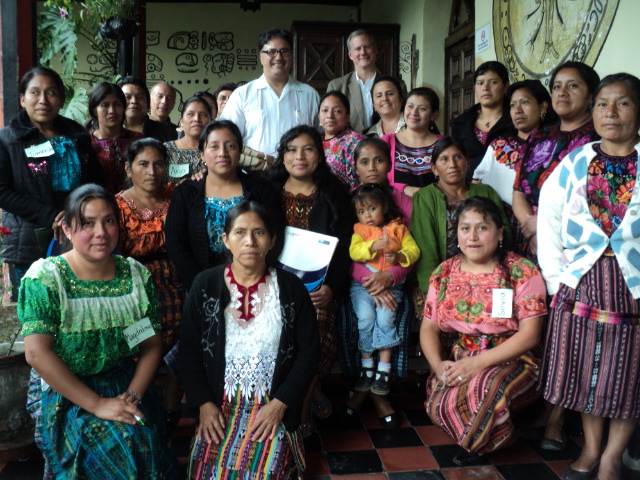The Health Policy Project ended in 2016. Work continued under Health Policy Plus (HP+) until 2022.
NEWS & VIEWS
Posted September 11, 2013
CHICHICASTENANGO, Guatemala-- Dr. Ariel Pablos-Méndez, Assistant Administrator for Global Health at USAID and a six-person delegation from USAID’s Guatemala Mission traveled on September 12 to Chichicastenango in the department of Quiché to meet with groups that receive USAID support for health, nutrition and education programs. More than 20 civil society leaders braved washed out highways and mudslides to participate in the two-hour meeting. These women and men represented civil society alliances and networks that the Health and Education Policy Project (HEPP) partners with. Speakers from the National Alliance and local Network of Indigenous Women’s Organizations for Reproductive Health, Nutrition and Education (ALIANMISAR and REDMISAR) and the local Network of Men for Health, Education and Nutrition (REDHOSEN) shared with Dr. Pablos-Mendez the results of their important advocacy efforts. These focus on healthy motherhood, responsible parenthood, and improving quality of education, especially for girls. They are focused on improving services in targeted health centers and schools and raising citizens’ awareness about their rights. The groups displayed “before and after” photographs of some achievements.
In an interview with the local television channel after the meeting, Dr. Pablos-Mendez, a Mexican-American who speaks fluent Spanish, said that USAID is committed to supporting programs that combat maternal and infant mortality and malnutrition, and that strengthen education. He was pleased to see how these programs are “empowering the people to improve their own health, nutrition, and education.” He remarked that, “Everything is possible. It’s even possible to prevent any mothers and infants from dying in this region. This is the dream I want you all to work to realize.”
HEPP strengthens civil society groups that protect citizens’ rights to high-quality health, nutrition, and education. The project fosters the participation of civil society groups in policy dialogue and planning at the national, departmental, and municipal levels. HEPP also works closely with the Ministry of Public Health and Social Assistance as well as multisectoral groups, civil society groups, and other local stakeholders to support policy changes that address inequities in health services. These activities contribute toward improving national and local governance, linking government and civil society to strengthen transparency and accountability, as well as the quality of education and quality of and access to health and nutrition services.
For more information on HEPP’s activities in Guatemala, see http://www.healthpolicyproject.com/index.cfm?id=country-GuatemalaEng.
What's New
- Something to Build On: “Innovation Exchange” Celebrates the Health Policy Project’s Close and a New Beginning
- What Will it Take for Tanzania to Achieve ART Targets and Ensure Long-Term Sustainability of the HIV Response?
- Helping Kenya’s County Leaders Advocate for Increased Health Investments
- HPP Holds Working Meeting on Ensuring Responsible PEPFAR Transitions for Key Populations
- Health Policy Project Celebrates 2016 International Women's Day
- HPP Staff Participate in White House Conference on HIV Stigma Reduction


